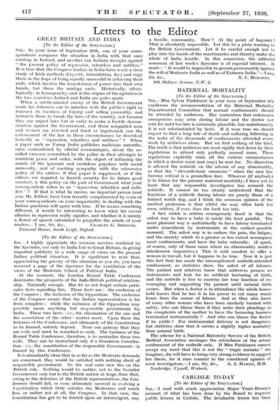MATERNAL MORTALITY
[To the Editor of the SPECTATOR.] SIR,—Miss Sylvia Pankhurst in your issue of September 6th condemns the recommendation of the Maternal Mortality Departmental Committee that normal confinements should be attended by midwives. Her contention that unforeseen emergencies may arise during labour and the doctor not sent for until too late is extremely plausible, but unfortunately it is not substantiated by facts. If it were true we should expect to find a long tale of death and suffering following in the wake of the thousands of confinements attended every week by midwives alone. But we find nothing of the kind. The truth is that midwives are most rigidly tied down by their regulations to attend only perfectly normal eases. These regulations explicitly state all the various circumstances in which a doctor must (not may) be sent for. No discretion is allowed the midwife on the advent of any abnormality, so that the " eleventh-hour summons " when the case has become critical is a groundless fear. Whoever (if anybody) is to blame for the present maternal mortality, I have yet to learn that any responsible investigator has accused the midwife. It cannot be too clearly understood that the functions of a midwife during labour are purely those of a trained watch dog, and I think the common opinion of the medical profession is that whilst she may often bark too soon, seldom, if ever, does she bark too late.
A fact which is seldom courageously faced is that the safest way to have a baby is rarely the least painful. The most pleasant way is undoubtedly to have labour terminated under anaesthesia by instruments at the earliest possible moment. The safest way is to endure the pain, the fatigue, and the anxiety which to a greater or less extent accompany most confinements, and have the baby naturally. (I speak, of course, only of those cases where no abnormality renders interference imperative.) This is cold comfort to offer a woman in travail, but it happens to be true. Now it is just this fact that has made the uncomplicated midwife-attended confinement, as statistics show, the safest of all labours. The patient and relatives know that midwives possess no instruments and look for no artificial hastening of birth, and the midwife is free to exercise her true function of en- couraging and supporting the patient until natural birth
occurs. But when a doctor is in attendance the whole house- hold knows that he has it in his power to cut many weary hours from the course of labour: And as they also know of many other women who have been similarly treated with safety, who can blame them if they unite their pleadings to the complaints of the mother to have the harassing business terminated instrumentally ? And who can blame the doctor if he yields ? For instrumental delivery is not dangerous, but statistics show that it carries a slightly higher mortality than natural birth.
The scheme'for a National Maternity Service of the British Medical Association envisages the attendance at the actual confinement of the midwife only. If Miss Pankhurst cannot accept my word that this is not the " tragic mistake " she imagines, she will have to bring very strong evidence to support her thesis, for it runs counter to the considered opinion of
most investigators.—I am, Sir, &c.; A. J. }fawns, M.B. Nembridge, LrpurA, Wisbech.


































 Previous page
Previous page